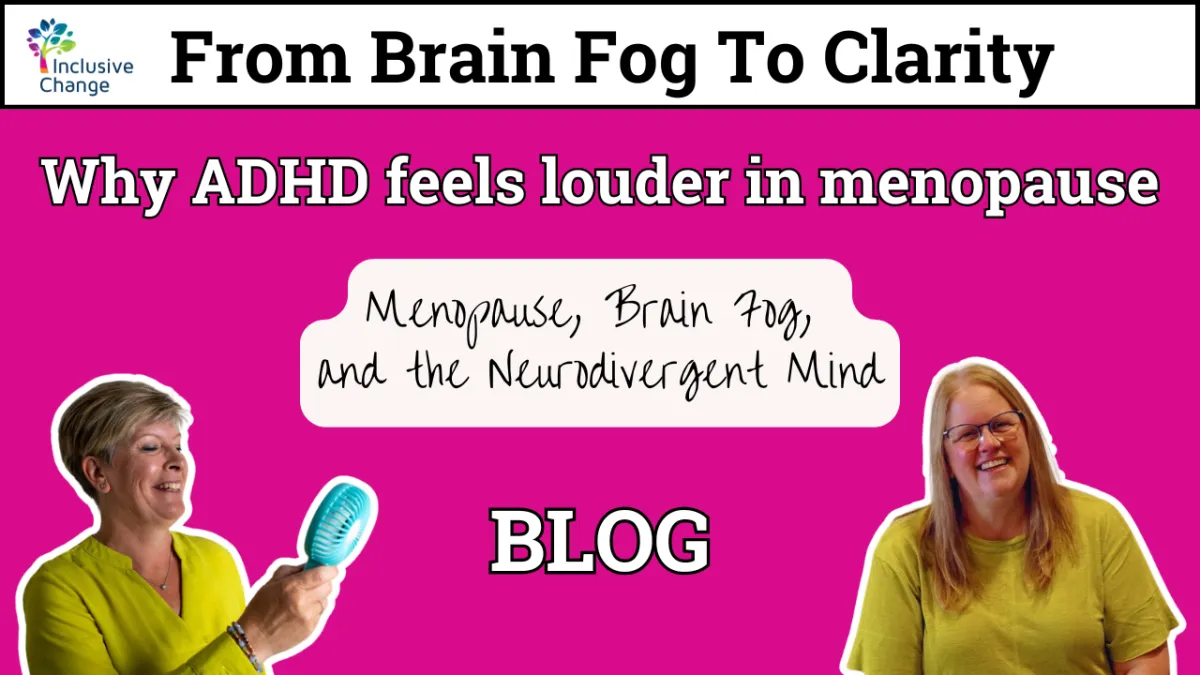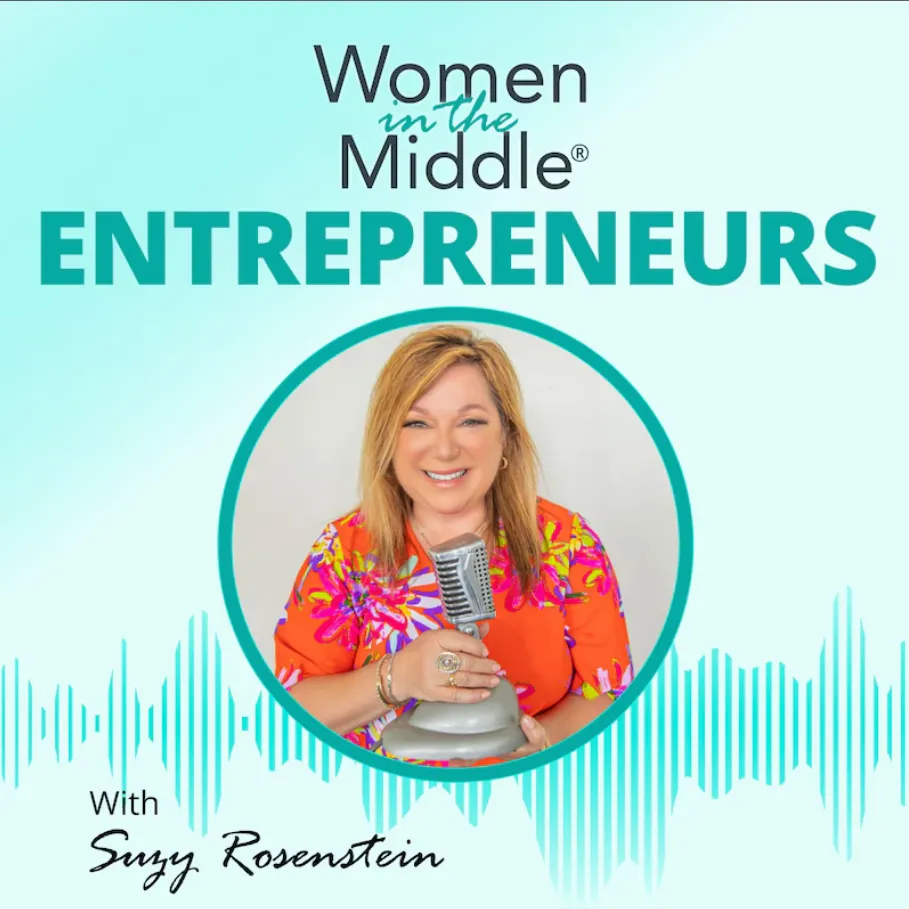Inclusive Change
Start the conversation
Read our blogs and discover more about neurodiversity through our links


ADHD and Menopause: Why It Feels Louder Now
Understanding the ADHD + Menopause Collision - And What You Can Do About It
You’re standing in the kitchen, staring at three open drawers, your tea’s gone cold, and you’ve just opened Instagram for the fourth time in 10 minutes. You wonder, 'Was I always like this, or is it getting worse?'
If you have ADHD and you’re entering perimenopause or menopause, you’re probably noticing that symptoms you once had 'under control' now feel amplified.
You’re not imagining it.
When ADHD and Hormones Collide
ADHD is already a condition that affects attention, motivation, memory, and executive function. Throw in the hormonal chaos of menopause, and you’ve got what many women describe as a cognitive rollercoaster with no seatbelt.
Why? Because hormones and brain chemistry are deeply connected.
Oestrogen helps regulate dopamine, the very neurotransmitter ADHD brains struggle to manage. As oestrogen levels drop during menopause, so does your brain’s ability to manage dopamine. And with it, go your focus, mood, and motivation.
Common ADHD Symptoms That Get Worse in Menopause
You might have always been the 'disorganised but gets-it-done' type, or someone who’s masked their ADHD for years with systems, routines, or sheer willpower.
Then menopause arrives, and suddenly:
•You forget appointments or entire conversations
•You can’t start simple tasks
•Your focus fractures after five minutes
•You feel more impulsive, emotional, or overwhelmed than ever before
•You bounce between anxiety and burnout in the same afternoon
And here’s the kicker: you can’t tell if it’s your ADHD, menopause, or both.
Spoiler alert: it’s both.
What ADHD Looks Like in Menopausal Women - Hint: It’s Not Always What You Think
If you’re imagining the hyperactive schoolboy stereotype, think again. ADHD in adult women, especially those in menopause, often shows up as:
•Brain fog that feels more like mental static
•Sensory overload that wasn’t there before
•A complete intolerance for multitasking
•Emotional intensity or shutdowns
•Paralysis in the face of simple decisions
It’s a neurological pressure cooker. And you’re still expected to work, parent, clean, care, plan, and 'just get on with it'.
The Mental Load Is Now a Mental Landslide
For many neurodivergent women, menopause is when the wheels finally fall off the invisible cart we’ve been dragging behind us.
The mental load, already sky-high from years of masking and managing ADHD, now feels unbearable. And because so few people talk about how menopause affects neurodivergent brains, many women internalise the struggle.
They think:
“I’m failing.”
“I can’t keep up.”
“I used to be better than this.”
The truth is: your brain hasn’t failed you. It’s signalling that it needs different support now, not more pressure.
What Can Help?
7 Tools That Actually Make a Difference
No fluff. Just things that work (and are realistic when your brain is foggy, your body is tired, and your emotions are doing the hokey pokey).
1. Simplify routines
Keep your systems visible, minimal, and repeatable. Morning routines, meal planning, even outfits, make them as predictable as possible.
2. Time-block your day
Use short blocks (15–30 minutes) for focus time, and buffer zones between tasks. Include breaks by default, not as an afterthought.
3. Set external cues
Your brain might not 'hold' tasks like it used to. Use phone alarms, sticky notes, or even talking timers to prompt action.
4. Move your body gently
You don’t need intense workouts. Just movement, walking, stretching, dancing, helps regulate dopamine and reduce overwhelm.
5. Speak your overwhelm out loud
Whether it’s to a coach, a friend, or into your voice notes, naming what’s hard defuses its power.
6. Honour your sensory needs
Avoid noise where possible, dim the lights, wear comfy clothes. Menopause can crank your sensory dials, so adjust your environment accordingly.
7. Adjust your expectations
You’re not a machine. Rest is not a luxury. Capacity shifts daily. What you can do today is enough.
“It’s Like I’m Meeting My Brain for the First Time”
That’s what one woman in our community said recently. And it’s true, menopause forces many neurodivergent women to confront the ways we’ve been over-functioning, over-masking, and over-explaining for decades.
It’s disorienting, but it can also be empowering.
Because for the first time, you might start making choices based on what you actually need. Not what looks good. Not what keeps you performing. But what helps you feel safe, supported, and like yourself again.
You’re Not Lazy. You’re Recalibrating.
The world wasn’t built for neurodivergent women in midlife. But you’re building your own way forward, and you’re not doing it alone.
If this post spoke to something deep in your bones (or your brain), it’s because we see you. And that’s exactly why we created the From Brain Fog to Clarity workshop.
It’s a 90-minute, zero-fluff, neurodivergent-safe space where we unpack what’s happening in your brain and body, and give you real, doable ways to move through it.
Join us here:
https://inclusivechange.co.uk/brain-fog-to-clarity-workshop
Check out Lucy's other features

A Journey of Neurodiversity Advocacy and Change
Read Lucy's interview with Golden Valley, where she explains some of the life events that led her to becoming a full time advocate for neurodivergent and disabled people in the workplace.

Women in the Middle® Entrepreneurs:
EP #52: Sharing the Positives About Neurodiversity with Lucy Smith
Suzy Rosenstein, a master life coach, hosts a podcast called Women in the Middle Entrepreneurs, a podcast where these important conversations about the intersection of being a midlife entrepreneur who's also a woman 50 plus can happen.
Inclusive Change Ltd
The Brightwell, Bradbury House
Wheatfield Drive
Bradley Stoke, Bristol
BS329DB
Copyright 2025 - Inclusive Change Ltd
Companies House: 12412464
VAT NO: 352 1564 17
ICO Reg: ZB081779
UK Register of Learning Providers: 10090652
Reg no: 12412464




